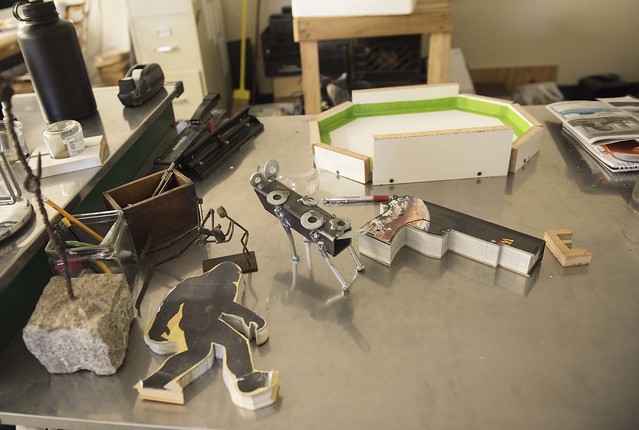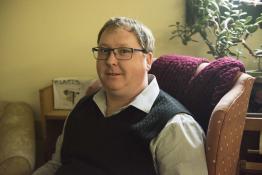Athens Makerspace provides resources for community members with support from Voinovich School
The Athens MakerSpace, an initiative of ReUse Industries, opened in October 2018 with the help of the Voinovich School of Leadership and Public Affairs and the LIGHTS Regional Innovation Network at Ohio University.
The MakerSpace beckons entrepreneurs, makers and hobbyists with regular classes and events on a range of topics and skills such as welding, woodworking, crafting with fabrics and more. It also includes a tool lending library that spares community members the burden of purchasing costly equipment for their trades and crafts.
Some of the most popular programs hosted at the Makerspace so far have been a women’s welding class, an intensive corset-making class, and several “make it take it” woodworking course offerings. Beyond basic skill building courses, the Makerspace also provides value to the Athens area as a space where visitors can rebuild the idea of community through shared creativity. Currently, the Makerspace is working to organize classes and events that attract students, such as a vintage gaming night and a university course on Japanese toy making.
The Makerspace grew out of a partnership between the Voinovich School and Reuse Industries. Nearly eight years ago, the entities joined to successfully acquire Sugarbush Foundation funding to support a zero-waste boutique thrift store, known as ReUse on Union. Through the grant, Voinovich School professionals and Reuse Industries staff and board expanded the nonprofit’s opportunities and features. The Makerspace is the latest piece of the collaboration.
“We’ve collaboratively been working on many innovative ways in which Reuse Industries has attempted to take this waste stream and divert it from landfill to upcycled items, to resale in the boutique thrift store, and to use for affiliated sales with the Makerspace,” said Faith Knutsen, director of Social Enterprise Ecosystem (SEE) Appalachia, a Voinovich School program that supports mission-driven social enterprises.
The Makerspace also receives important support from multiple other local partners, key among them being the LIGHTS network, a program run by Ohio University’s office of the Vice President of Research. LIGHTS’ place-based makerspace hubs stretch across three states, with professional staff providing capacity-building and equipment access, as well as individual startup coaching and events.
The Makerspace officially opened its doors just weeks after the new ReUse Industries Chief Executive Officer, Zeb Martin, took over the leadership of the organization. Martin, who received both his Master of Public Administration and Master of Science in Environmental Studies degrees from the Voinovich School, said tailoring the Makerspace to suit the needs of the Athens-area community has been a significant part of his work to date.
“It took incredibly hard work by ReUse Industries staff, partners and supporters to get the Makerspace off the ground as a community asset and space for learning and making. The Board is grateful to Zeb and the staff for their tireless hours enabling the full operation of this community resource,” said Brian Vadakin, ReUse Industries’ Board Chair who works for Rural Action as its Social Enterprise Coordinator.
“It’s really great to see Makerspace members in there, using the space, and working together daily,” he added. “To see what it can become is amazing.”
Martin explained Makerspaces typically lack support in rural areas. On average, a U.S. Makerspace supports a county of more than one million people; Athens County has fewer than 70,000 residents, according to the Athens Makerspace website. To suit the needs of Southeast Ohio, Martin noted that the Athens Makerspace has become a workforce development center where participants in the Make Your Future program can learn employable skills associated with trades.
“I think (the Makerspace) is one way to leverage a lot of resources for folks in the area that don’t have access to those types of resources on their own,” Martin said. “That’s kind of what makes it a special place - a place of collaboration, a place to access things you wouldn’t normally have access to.

